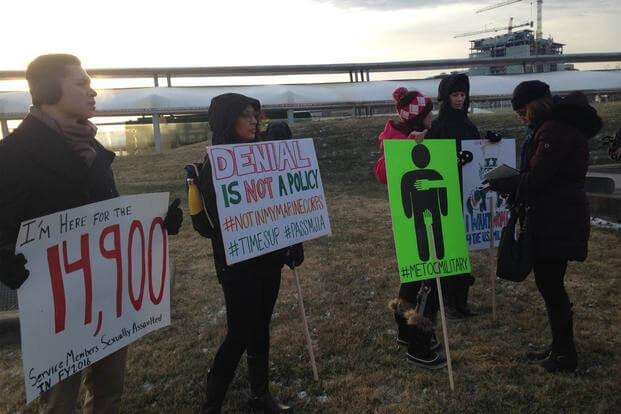Veterans groups demonstrated in bitter cold Monday outside the Pentagon to turn some of the focus of the "#MeToo" movement toward sexual harassment and assault in the ranks.
"It is time that there is a safe way to report sexual assault in the military so that men and women serving our country have the freedom to say 'Me Too' instead of silence," said Nichole Bowen-Crawford, a former Army E-4 who said she was sexually assaulted in Iraq.
Bowen-Crawford was among about 30 to 40 demonstrators who said they were inspired by the "#MeToo" movement that has gone viral amid continuing revelations of predatory behavior, harassment and assault by men in positions of power in Hollywood, the media and Congress.
The demonstration organized by the Service Women's Action Network (SWAN) and joined by representatives of other veterans groups was sanctioned by the Defense Department.
However, Navy Lt. Cmdr. Gary Ross, a Pentagon spokesman, told Military.com that the DoD had not itself conducted any events or initiatives stemming from the "#MeToo" movement.
"We already have a very proactive position in this regard," he said. "We are already very active in regards to training and internal awareness campaigns to train our internal audience to understand what is unacceptable."
DoD officials said currently serving military personnel could participate in the demonstration, so long as they were not in uniform.
Several of the demonstrators carried signs in support of the Military Justice Improvement Act, sponsored by Sen. Kirsten Gillibrand, D-New York, which would change the way sex crimes are reported and prosecuted in the military.
According to Gillibrand's website, the proposed legislation would move "the decision over whether to prosecute serious [sex] crimes to independent, trained, professional military prosecutors, while leaving uniquely military crimes within the chain of command."
At the demonstration, Monica Medina, a former Army captain who later served as a special assistant to former Defense Secretary Leon Panetta, said the Pentagon's own surveys show that about 80 percent of women in the military say they've been sexually harassed during the course of their careers.
"That's twice the number in the private sector," Medina said. "We've got to encourage more women to come forward. Time is up."
Former Coast Guard Judge Advocate General's officer Denise Krepp, who later became chief counsel to the U.S. Maritime Administration, said the fear of retaliation preventing many women from coming forward "existed 20 years ago and it hasn't changed. We still have these problems with sexual assault."
"People have not been fired," Krepp said, "and it's not just the senior officers, it's the political appointees" who have been preying upon women in the ranks.
In the current military culture, "you're more likely than not to be retaliated against" for reporting a sex crime, said Lydia Watts, SWAN chief executive officer. "Where is the decisive action against our assailants?"
Bowen-Crawford said she was assaulted in 2003 in Iraq by a sergeant while working the night shift.
"I didn't report it," she said, after being told by friends that it would be pointless and would probably ruin her career. The sergeant was later promoted, she added.
The problem for many female victims of sexual assault in the military often is that "you have to report the sexual assault to the perpetrator or their friends," Bowen-Crawford said.
She said the #MeToo" movement is bringing new awareness to the persistence of sexual assault in other fields and now "the military is next."
-- Richard Sisk can be reached at Richard.Sisk@Military.com.
Don't Miss a Single Military.com Story
To read the full article and get exclusive benefits, sign up today.
It’s FREE
Why am I seeing this? Visit our FAQs














